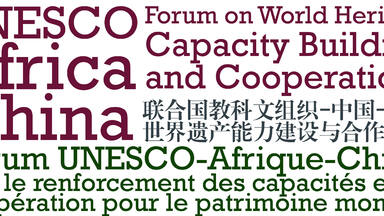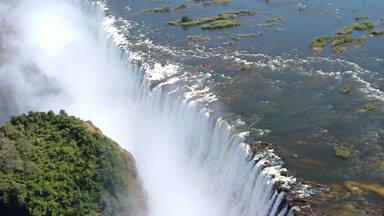UNESCO, Africa and China agree on projects to safeguard World Heritage in Africa
The UNESCO-Africa-China Forum on World Heritage Capacity Building and Cooperation, held at UNESCO Headquarters from 3 – 4 June 2019, concluded with Recommendations and an Action Plan for joint projects supporting long-term capacity building for the safeguarding of African World Heritage properties. It was attended by ministers, decision-makers, World Heritage site managers, academics and experts from Africa and China as well as the Vice-President in charge of Regional Development, Integration and Business Delivery at African Development Bank, among others.
The Recommendations call for greater cooperation between African and Chinese universities in the field of heritage, developing joint research on conservation, and promoting skills exchanges in thematic areas linked to sustainable development, urbanization, and traditional management systems of World Heritage sites in Africa and China. Sustainable development, through a balanced approach to conservation and benefits to local communities at World Heritage sites, was also stressed.
UNESCO’s Assistant Director-General for Culture, Mr Ernesto Ottone R., said that “safeguarding cultural and natural heritage in both Africa and China will require the mutual sharing of experiences on traditional management systems, site planning, conservation, community engagement, and infrastructure development.”
The Action Plan outlines several conservation projects to strengthen monitoring and management systems at World Heritage sites in Africa. These include Ecosystem and Relict Cultural Landscape of Lopé-Okanda (Gabon), the Cidade Velha, Historic Centre of Ribeira Grande (Cabo Verde), Koutammakou, the Land of the Batammariba (Togo), and the Old Towns of Djenné (Mali), among others. Other projects will assist in preparing World Heritage nomination dossiers for Barotse Cultural Landscape (Zambia), the Zakouma National Park (Chad), the Historic Town of Gedi (Kenya), and the Royal Domaine of Mbe (Congo), as well as one project in Sao Tome e Principe to develop a Tentative List for future properties. These projects will be financed through support from UNESCO’s strategic partners, including the Chinese National Commission for UNESCO.
Dr Khaled F. Sherif, Vice-President, Regional Development, Integration and Business Delivery at African Development Bank, emphasized that “Joint projects can be designed and a strong partnership can be built for the benefit of future generations and youth. This will allow us to harness, develop, and preserve Africa’s rich and diverse heritage and potential”
Ninety-five African sites from 35 States Parties are inscribed on the World Heritage List, fewer than 9% of all the inscribed properties. Yet, African sites account for one third of the List of World Heritage in Danger. China alone has 53 properties inscribed on the World Heritage List, none on the List of World Heritage in Danger. African and Chinese properties are sanctuaries for most of the world’s biodiversity.
The Forum built on UNESCO’s Priority Africa, and the long-standing relationship between China and African countries in safeguarding World Heritage. The Ambassador and Permanent Delegate of China to UNESCO, H.E. Mr Shen Yang, stressed that “World Heritage sites … play an important role in protecting biological and cultural diversity, catalyzing inter-civilization exchanges and mutual learning, and promoting sustainable development.”
A Memorandum of Understanding was signed between the African World Heritage Fund (AWHF) and the World Heritage Training and Research Institute for Asia and the Pacific Region (WHITRAP) to strengthen heritage safeguarding. Working together with UNESCO and the International Centre for the Study of the Preservation and Restoration of Cultural Property (ICCROM), these UNESCO Category 2 Centres will help implement the projects set out in the Action Plan.
The Recommendations and Action Plan of the Forum offer concrete measures to implement the shared priorities established under the UNESCO 1972 World Heritage Convention, the United Nations 2030 Agenda for Sustainable Development and the African Union Agenda 2063: The Africa We Want.
Information about the Forum is available here.


